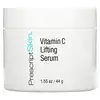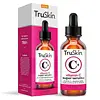What's inside
What's inside
 Key Ingredients
Key Ingredients

 Benefits
Benefits

 Concerns
Concerns

 Ingredients Side-by-side
Ingredients Side-by-side

Water
Skin ConditioningGlycerin
HumectantSodium PCA
HumectantHydrolyzed Collagen
EmollientHydrolyzed Elastin
EmollientAscorbic Acid
AntioxidantPolysorbate 20
EmulsifyingSodium Hydroxide
BufferingCarbomer
Emulsion StabilisingAloe Barbadensis Leaf Juice
Skin ConditioningTocopherol
AntioxidantCitric Acid
BufferingAesculus Hippocastanum Seed Extract
Skin ConditioningHydroxyethylcellulose
Emulsion StabilisingPrunus Armeniaca Fruit Extract
Skin ConditioningRosa Centifolia Flower Extract
AstringentRosmarinus Officinalis Leaf Extract
AntimicrobialTocopheryl Acetate
AntioxidantDisodium EDTA
Retinyl Palmitate
Skin ConditioningLactic Acid
BufferingMalic Acid
BufferingGluconic Acid
Glycolic Acid
BufferingSalicylic Acid
MaskingTartaric Acid
BufferingEthylhexylglycerin
Skin ConditioningCitral
PerfumingLimonene
PerfumingParfum
MaskingBenzyl Alcohol
PerfumingWater, Glycerin, Sodium PCA, Hydrolyzed Collagen, Hydrolyzed Elastin, Ascorbic Acid, Polysorbate 20, Sodium Hydroxide, Carbomer, Aloe Barbadensis Leaf Juice, Tocopherol, Citric Acid, Aesculus Hippocastanum Seed Extract, Hydroxyethylcellulose, Prunus Armeniaca Fruit Extract, Rosa Centifolia Flower Extract, Rosmarinus Officinalis Leaf Extract, Tocopheryl Acetate, Disodium EDTA, Retinyl Palmitate, Lactic Acid, Malic Acid, Gluconic Acid, Glycolic Acid, Salicylic Acid, Tartaric Acid, Ethylhexylglycerin, Citral, Limonene, Parfum, Benzyl Alcohol
Ascorbic Acid
AntioxidantHyaluronic Acid
HumectantRosa Canina Fruit Oil
EmollientDimethyl Sulfone
SolventRetinol
Skin ConditioningSqualane
EmollientNiacinamide
SmoothingArginine
MaskingSalicylic Acid
MaskingCitrus Grandis Peel Oil
MaskingAloe Barbadensis Leaf
MaskingCentella Asiatica Extract
CleansingEquisetum Arvense Extract
AstringentGeranium Maculatum Extract
TonicCarbomer
Emulsion StabilisingPhenoxyethanol
PreservativeEthylhexylglycerin
Skin ConditioningAscorbic Acid, Hyaluronic Acid, Rosa Canina Fruit Oil, Dimethyl Sulfone, Retinol, Squalane, Niacinamide, Arginine, Salicylic Acid, Citrus Grandis Peel Oil, Aloe Barbadensis Leaf, Centella Asiatica Extract, Equisetum Arvense Extract, Geranium Maculatum Extract, Carbomer, Phenoxyethanol, Ethylhexylglycerin
Ingredients Explained
These ingredients are found in both products.
Ingredients higher up in an ingredient list are typically present in a larger amount.
Ascorbic Acid is is pure Vitamin C. This form makes up the largest amount of vitamin C found naturally in our skin.
Not only is vitamin C great for your overall health and immune system, it also has plenty of benefits on your skin.
Vitamin C is best used for brightening skin. It improves dark spots, acne scars, and hyperpigmentation. This is because it blocks the process of skin darkening when exposed to UV.
Remember: Vitamin C should not replace sunscreen!
Your skin uses vitamin C to build collagen. Collagen is one key component in having a strong skin barrier and plump skin. Vitamin C also plays a role in regulating collagen, thus making it effective in improving wrinkles and fine lines.
Ascorbic acid shows potent antioxidant activity. As an antioxidant, it helps fight free-radicals. Free-radicals are molecules that may damage your skin cells. These antioxidants also protect skin against UV damage.
The best formulations include Vitamin E and/or ferulic acid. These two ingredients help stabilize and provide a boost in the benefits of ascorbic acid. This is because ascorbic acid becomes unstable when exposed to UV and air. In fact, you can tell your ascorbic acid has oxidized when it turns an orange-yellow color.
Ascorbic acid is generally compatible with other ingredients. However, using ascorbic acid with other active ingredients might cause irritation. Two ingredients: copper ions and benzoyl peroxide, will inactivate ascorbic acid completely.
Read more about other types of Vitamin C:
Foods rich with vitamin C include oranges, strawberries, broccoli, bell peppers, and more. When consuming Vitamin C, your skin receives a portion of the nutrients.
Learn more about Ascorbic AcidCarbomer is a polymer of acrylic acid. Its main role is to create a gel consistency.
A high amount of carbomer can cause pilling or balling up of products. Don't worry, most products contain 1% or less of carbomer.
Ethylhexylglycerin (we can't pronounce this either) is commonly used as a preservative and skin softener. It is derived from glyceryl.
You might see Ethylhexylglycerin often paired with other preservatives such as phenoxyethanol. Ethylhexylglycerin has been found to increase the effectiveness of these other preservatives.
Salicylic Acid (also known as beta hydroxy acid or BHA) is a well-known ingredient for treating skin that struggles with acne and clogged pores. It exfoliates both the skin's surface and deep within the pores to help clear out buildup, control oil, and reduce inflammation.
Unlike AHAs (alpha hydroxy acids), salicylic acid is oil-soluble. This allows it to penetrate into pores which makes it especially effective for treating blackheads and preventing future breakouts.
Salicylic acid is also known for its soothing properties. It has a similar structure to aspirin and can calm inflamed or irritated skin, making it a good option for acne-prone skin that is also sensitive.
Concentrations of 0.5-2% are recognized by the U.S. FDA as an over-the-counter topical acne product.
It can cause irritation and/or dryness if one's skin already has a compromised moisture barrier, so it's best to focus on repairing that before introducing this ingredient into your routine.
While salicylic acid does not increase sun sensitivity, it’s still important to wear sunscreen daily to protect your skin.
If you are looking for the ingredient called BHA or Butylated Hydroxyanisole, click here.
Learn more about Salicylic Acid